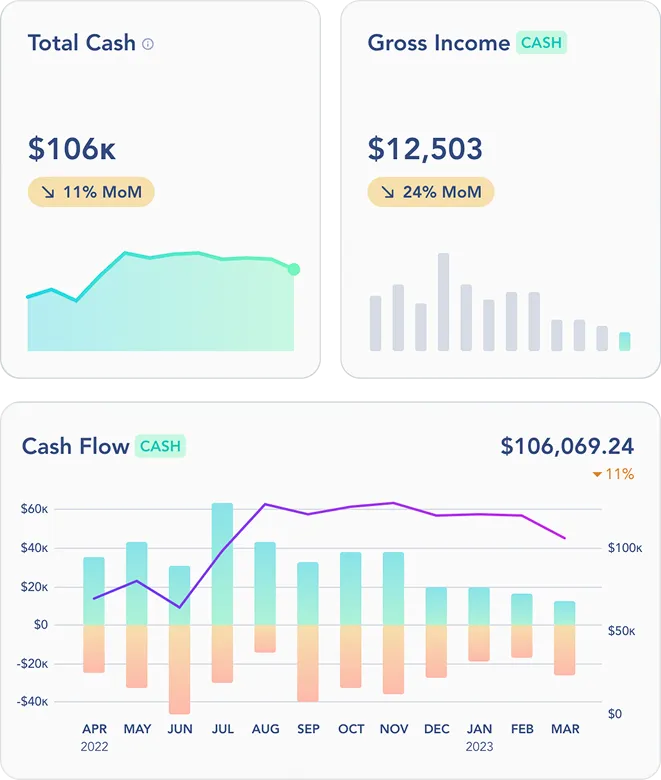
6 Best Pilot Bookkeeping Alternatives in 2025
 Team Digits
Team Digits
Every penny counts when running a business, but for startups, it's even more important to know where your money goes.
Accounting and bookkeeping services provide the necessary checks and balances, so you know your cash is going to the right places and you have enough to make it to the next phase of your business growth. Good bookkeeping and accounting also help keep investors in the know and your tax and legal departments happy.
If you've been using Pilot, you may feel left out of some of the more advanced bookkeeping and accounting features available today, including real-time insights and access to seamless automation. So, if you’ve been thinking of moving on from Pilot, what else is there on the market? In this guide, we’ll run through the 6 best Pilot alternatives so you can find the accounting and bookkeeping service right for your business.
Why are businesses looking for alternatives to Pilot?
Pilot is a bookkeeping and accounting services company that relies on Quickbooks and their in-house team of accountants to handle financial tasks for its customers. It bills monthly and is often compared to other software-as-a-service offerings.
Although many businesses are happy with paying Pilot to help them with their books, others have found it’s just not the right service for them. Here are just a couple of reasons why.
Cost
Pilot's pricing starts at $349 monthly for the basic accounting plan for companies with less than $30,000 in monthly expenses. This can be a substantial expense, especially for smaller companies or early-stage startups just starting out.
Prices then range from $409 to $999 as expenses grow. This expense is on top of a one-off fee equivalent to one month of service as an onboarding charge.
Businesses that use Pilot also need to buy and use a Quickbooks online account to get their bookkeeping done each month, which is an additional cost for companies.
All in all, Pilot can be a hefty expense that a founder may feel isn’t the right fit for their budget.
Automated technology
Since Pilot runs on legacy ledgers like Xero and Quickbooks Online, everything from data quality to collaboration is limited to the capabilities of these systems. You are paying for the labor and solutions that are developed to wrestle structural inefficiencies of decades-old accounting systems. This also means you won't get newer features like automated bill pay or transaction coding, which can help teams take their data quality and accounting automation to the next level.
For companies looking for self-driving accounting™, this can be a good reason to look for an alternative to Pilot.
Slow turnaround time
Because Pilot relies heavily on people, it takes between 15 and 21 business days after the month's end for the books to finish and closeout. Some customers have reported not having books by the 25th of the month and waiting a long time for catch-up bookkeeping.
For many startups, this just isn’t fast enough. They need real-time insights into their financials so they can take meaningful action right away.
What to look for in your next bookkeeping and accounting software
When finding the perfect fit, many considerations must be made. For some, price alone may be enough to try a new bookkeeping and accounting solution.
However, some of the latest tools on the market have innovated to provide more features with less of a learning curve. In addition to the price, ask about the following:
- Integrated solutions that don't require you to pay for software and service separately
- Proprietary AI capabilities, beyond just chatbots or support tools
- Intuitive reporting that can impress clients and investors
- Secure storage and sharing of documents and reports
- Bill-pay and invoicing features
- Whether catch-up services are offered
- Whether taxes are included and how they're handled
- The time it takes for books to be finalized and delivered
While not a mandatory feature, the ideal product will help you with your most pressing administrative pain points. For some, that's writing executive summaries or coding transactions; for others, it's understanding their underlying financial metrics.
Looking at some Pilot alternatives can help you address the top burdens facing your business so you can find the accounting and bookkeeping service that is perfect for you.
The 6 best Pilot alternatives to consider
If you're looking for another option to Pilot, you're not alone. We've compiled this list of respected competitors to help you find the right fit for your ongoing bookkeeping needs:
1. Digits
Cost: Starting at $150 per month
Who it's best for: Startups in any industry looking to own their data and accounting processes with the help of AI insights, accurate reporting, and bill pay / invoicing services.
Digits is self-driving accounting™ that pairs the power of ai bookkeeping with the checks and balances of human accountants. Rather than forcing you to hand off your accounting to strangers and pay for a bundle of different software (Quickbooks, BILL, etc) each with its own login, it gives you complete control of your finances through an integrated accounting platform.
Its advanced AI technology makes financial tasks more hands-off while still being rigorously accurate. The white-glove onboarding is notable in the industry and has helped startups get their financials into a real-time, automated workflow.
Digits AI learning models have been trained on over $700 billion in transactions, helping it accurately categorize the various transaction types common in various industries. It also flags discrepancies in real time, so your books are always in tip-top shape.
Digits also offers automated transaction coding, which reduces much of the work done by bookkeepers today. Add in the built-in Bill Pay features and automated payable schedule, and it's seamless to pay vendors and partners, even with irregular payment amounts.
Digits' accrual accounting software is also speedy and efficient, allowing you to close your books within five days of a month's end (that's days or even weeks faster than what competing software solutions offer).
Plus, Digit's U.S.-based, in-house accountants verify all your activity, meaning it's not just quick, it's always accurate. This expert accountant support also means that Digits can handle sales tax, tax preparation, and handoff to tax specialists.
Finally, Digits' reporting features are fully customizable without requiring any report-building know-how. The drag-and-drop interface makes it simple to set up reports for various use cases and share them with colleagues or investors.
With transaction-level commenting and interactive "hover to discover" features, anyone can drill down to incredible detail without requesting a new report or even leaving the reporting dashboard. Reporting is also in real-time, giving stakeholders the information they need to respond quickly to issues throughout the month without waiting for monthly close.
Digits frequently updates its offerings to make bookkeeping even more accessible to those doing it for the first time. It's a truly inclusive service that combines the best of AI shortcuts with the trustworthiness of human support.
Pros:
- AI and automation save you time and effort
- Vibrant, customizable reports to wow investors
- Startup-friendly pricing
- Close books within five business days
- Pay your bills in seconds with Automated Bill Pay
- Verified by in-house, U.S.-based expert accountants
Cons:
- Not appropriate for those wanting to outsource all their bookkeeping or want high-touch relationships with accountants
2. Bench
Cost: Starting at $249 a month
Who it's best for: Companies wanting to outsource all their cash basis bookkeeping but still handle bill paying and some reporting tasks.
Bench is a bookkeeping solution for companies that need a personal bookkeeping expert for catch-up or ongoing work. The service is not standalone software and isn't designed for those who want to keep their financial accounting in-house. Users submit their records at the end of the month and get reports back within 15 business days, which they can view from their software login.
The premium service offers some tax support, and bookkeepers are available for questions (with a one-day turnaround during weekdays). Bench only supports cash basis and doesn't offer bill pay services.
Pros:
- Bookkeeping done by others
- Some tax support included
- Free access to bookkeeping professionals
- Startup-friendly pricing
Cons:
- Not for those wanting to handle their own bookkeeping
- Books close around 15 business days
- Doesn't support accrual basis
- No bill pay services
3. Fincent
Cost: Starting at $299 a month for basic plan
Who it's for: Companies that want to log into bookkeeping software for reporting but still want a human accountant to handle all the work.
Fincent is a well-rounded bookkeeping option offering cash and accrual basis bookkeeping, tax preparation, and even bill-paying services. However, users will need to get Quickbooks to be able to use the service or allow Fincent to create an account for them. The service needs access to Stripe to access accounts receivable.
Since Fincent relies on human bookkeepers, it can take longer to finish books at the end of each month. The company estimates that it could take 15-20 business days to get reports from the previous month.
Pricing is based on plan type and monthly expenses, starting at $299 for fees under $10,000. As your startup spends more, the price increases, with prices for larger companies topping $999 or more per month for basic services.
Pros:
- Offers accrual basis accounting
- Bill-pay included
- Affordable basic plan with minimal expenses
Cons:
- Price increases dramatically with more expenses
- Close books in 15-21 days or longer
- Quickbooks and other external tools needed for full experience
4. Zeni
Cost: $349 a month for basic AI features
Who it's for: Startups that want all of their financial services, including payroll and business banking, in one higher-priced monthly offering
Zeni aims to bundle most of the startup business needs into one solution, offering AI-based bookkeeping, human support through fractional talent, tax services, card solutions, and even a business checking account. Users can opt for just the bookkeeping plan, however, which gives access to bookkeeping, bill pay, and checking accounts. Users can "close" books daily by checking the dashboard for the current, real-time financials.
While Zeni puts AI front and center in its platform, offering some innovative solutions to help your team save time and effort, it comes at a cost higher than other plans on the market. It also makes checking accounts part of the offering by default; startups just wanting bookkeeping and reporting services but who are happy with their bank may find this perk redundant.
Similar to Pilot, Zeni will only work with Quickbooks Online Plus. The team will need you to migrate if you use a different software.
Pros:
- AI-based transaction identification
- Robust reporting
- Bill pay available
- Access to a team of experts
Cons:
- Comes bundled with additional services (business checking)
- Higher price point
- Must buy and use Quickbooks online
5. Kruze Consulting
Cost: $600 a month and up
Who it's for: Startups past their pre-seed funding stage who want to pay high prices for a dedicated bookkeeping team to handle financials and transition to other automated tools
Kruze Consulting is one of the few options on this list that markets itself first as a human bookkeeping service that uses AI to enhance the experience. While its website mentions that the company uses AI technology, its AI focus is transitioning clients to services that primarily rely on AI tools, such as Ramp or Gusto.
Kruze is not a software solution and does not empower startups to keep their bookkeeping in-house. As such, it charges much more than other solutions and even recommends that startups do their own bookkeeping until they reach $250,000 in revenue. Some features, like Bill Pay and earlier financial deliveries, are not available on the lower-priced plan and come as add-ons for the plans priced at $800 a month or more.
Pros:
- Hands-off bookkeeping services
- Uses proven AI-based partners for integrations
- Large suite of add-ons available
Cons:
- High price points not friendly to newer startups
- Most features come as add-ons
- Closing of books more in line with traditional timelines
6. Finta
Cost: $100 - 250 a month
Who it's for: Startups with minimal, in-house bookkeeping needs that want to track and manage spending with a software solution
Finta is software designed to replace bookkeepers. It uses automated technology to categorize transactions, giving users a real-time view of their startup's financial situation.
Finta doesn't offer human bookkeepers, as it seeks to replace them. It relies on external data to categorize expenses, such as the information provided by a Ramp credit card. It doesn't use AI to bring insight to transactions or reporting.
Pricing for Finta is competitive with other lower-cost services. Those looking for forecast modeling and more robust reports will want to pay for the Growth option at $250 a month. Because Finta acts as the bookkeeping software, there's no need to buy Quickbooks or another standalone solution.
Pros:
- Startup-friendly pricing
- No need to buy Quickbooks
- Offers accrual basis
Cons:
- Doesn't use AI or machine learning to improve results
- Not verified by U.S.-based expert accountants
- No accounts payable or receivable
- No Bill Pay capabilities
Take your finances to the next level with Digits
Since bookkeeping and accounting can make or break how you plan for your startup's success, it's important to choose the right solution. Most of the options on our list offer some advanced features, slick technology interfaces, and customer service to help you get started.
However, only Digits has packaged the expertise of bookkeepers into a seamless software solution that lets you maintain control of your startup's finances. You select transaction sources and let the advanced AI and machine learning engine check your work for errors, discrepancies, or concerning trends. You can access real-time updates and reports so you're fully informed of your startup's financial status at any point in the month.
It's the best of both worlds because you never hand off your bookkeeping tasks to someone who could take two weeks or longer to close out your books manually. And because the Digits bookkeeping solution is so intuitive, you don't have to handle the burden of traditional in-house on your own.
For those who want powerful, accurate, and secure accrual basis accounting at your fingertips, Digits has you covered. It offers everything you need, from basic bookkeeping to impressive executive summaries, all within a digital environment you can customize for your unique startup needs.
Learn how Digits can help your startup master its finances by contacting us for a demo.


